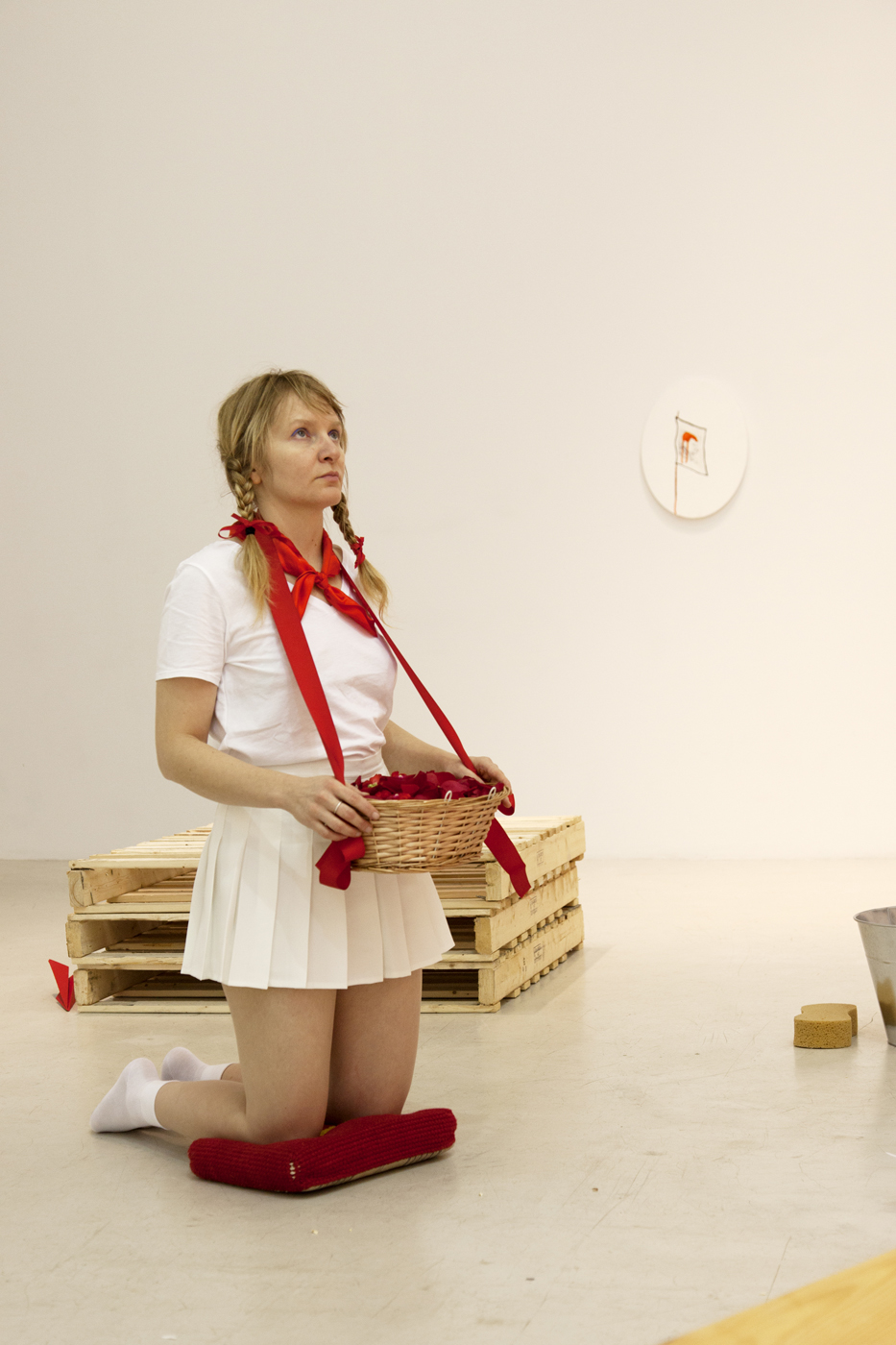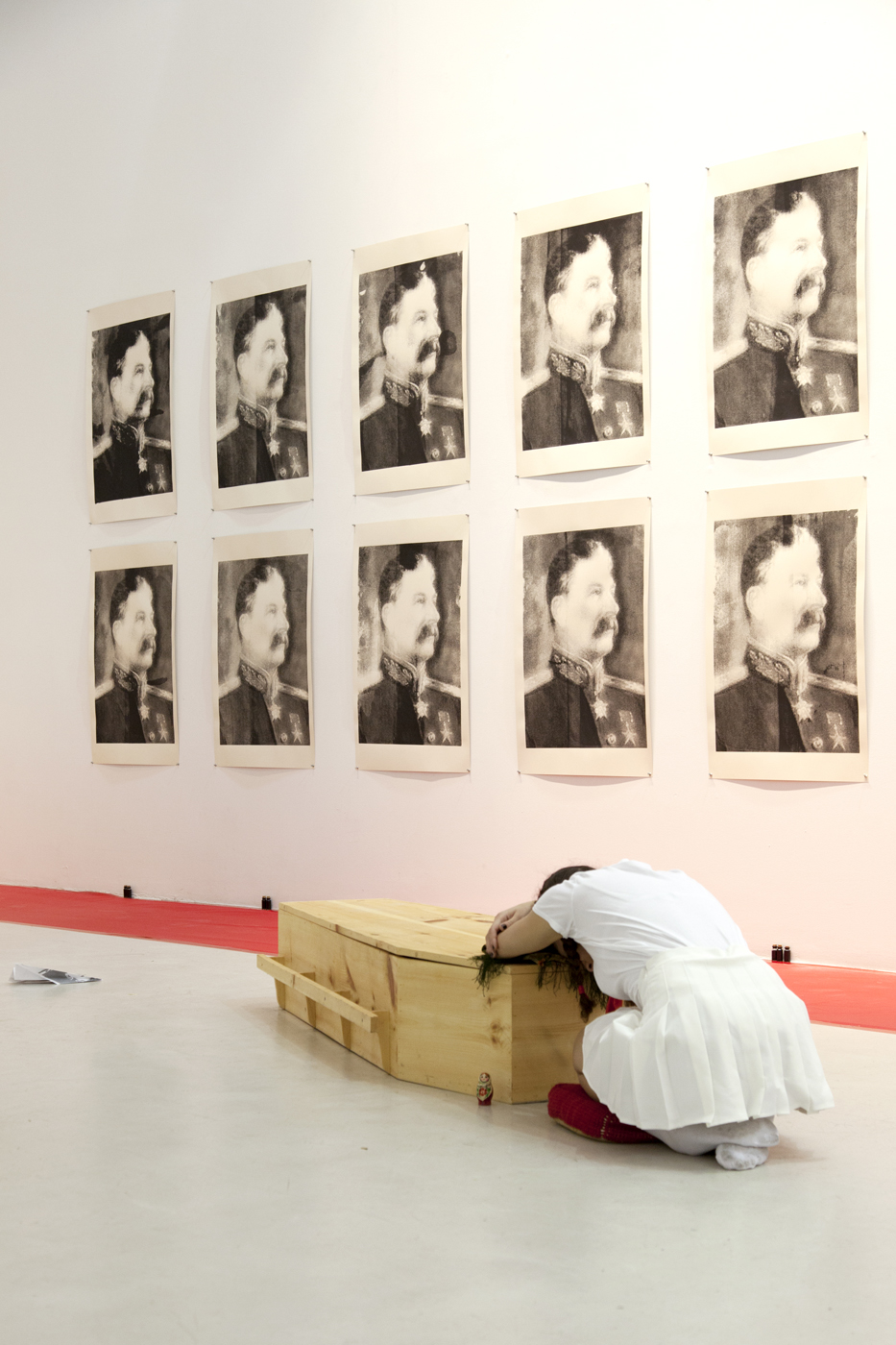Rachel Libeskind: The Day The Father Died
Monday, October 30, 2017
KHORASHEH + GRUNERT, New York
The Day The Father Died, 2017
KHORASHEH + GRUNERT is pleased to present The Day The Father Died, an installation and performance by artist rachel libeskind. The exhibition features video works, sound, poetry, sculptural elements, works on paper and paintings, all made in conjunction for the world premiere of The Day The Father Died, Libeskind’s most recent performance piece. The opening reception will take place on Wednesday, November 29th at 524 West 19th Street, from 6:30-8:30pm. The performance will begin promptly at 7:30pm. The exhibition will be on view through December 3rd. This marks Libeskind’s first exhibition at KHORASHEH + GRUNERT.
Rachel Libeskind’s The Day the Father Died dissects the death of the murderous Dictator and enigmatic 20th century Icon, Stalin. The trajectory of the performance is focused on the day that Stalin died in 1953 and the subsequent funereal ritual that engulfed the entire USSR; however, in essence, Libeskind comments on the infantilization of society under an authoritarian father-leader paradigm as seen with Stalin, Mao, Hitler, Tito, and others. Part re-enactment, part homage, at times critical yet humorous, the work is foremost autobiographical in nature. Libeskind owes her own existence to Stalin — her grandparents met in 1941 at a Gulag in what is now Kyzyl-Kiya. Both Polish Jews who escaped to Russia after the Nazi invasion of 1939, the artist’s ancestors were individually arrested and thrown into work camps. As the war progressed, they were moved further and further east. Years later, in Soviet Poland, Libeskind's father recalled the confusing day of Stalin's death — mired in loud sobs and whispered jubilations that the Vozdh had finally died. "And you have sent a black snowstorm over Moscow”….
“The myth of my Grandmother's rebellion against tyranny (Russian, Autocratic, Male) is a golden seed planted inside my mind that has grown branches which now extend how into the world. Jewish Whores make good agitators.” — Rachel Libeskind This confusion lasts until today, where factories that once printed hundreds of millions of Stalin's state portrait until 1990, have now resurrected the old printing machines, refilled their ink, and rigorously return to the deification of Josef Vissarionovich Stalin aka Zoso, the poet, the revolutionary, the killer, the father, the obsessive doodler, born Ioseb Jughashvili. Not only is Russia experiencing their own Stalin revival (amid a total revision of the facts that frame their history), but in light of the greater socio-political climate of our time, these issues resurface once more. Conceived in dialogue, the exhibition features a series of large format paintings that expands the artists unique combination of historicist appropriation and improvisational re-arranging. Using a variety of methods to work on canvas, Libeskind combines imagery and poetry, while utilizing a direct performative action and playful irreverence in process and application of image, text, paint, and ink on canvas. The two accompanying video works in the exhibition are whimsical narratives that combine the familiar with the unfamiliar, as Libeskind assembles, discovers, recycles, and re-invents various found footage together with her own sound collage.
The Day the Father Died explores the ambivalent and ambiguous relationship between authority and social reality. It frames this moment in history from a femme perspective, from the soul of children who have been conditioned to see Stalin as their father, creator — the man who keeps their mother Russia contented. Together, Libeskind’s performance and new body of work navigate the problem of sustaining a critical moment of aesthetic experience without legitimizing dictatorship, mass culture, mass production — or its supposed opposite. The common medium throughout is ambivalence.
rachel libeskind is a Brooklyn-based artist, born in Milan and raised in Berlin, Germany. She holds a B.A. with honors from Harvard University. Libeskind has shown her work in exhibitions in Paris, London, Milan, Rome, Warsaw, Vilnius, Miami and New York among other cities internationally. She is a multi-disciplinary artist, often merging her installation and performance with her studio practice. Libeskind’s work is characterized by a unique combination of historicist appropriation and improvisational arranging. Her work deals with issues of identity, the transmutations of past histories and the collection and curation of images and objects.
KHORASHEH + GRUNERT is a curatorial platform by curator Mitra Khorasheh within Tanja Grunert Gallery that materializes from time to time at 524 West 19th Street, NY, and beyond. The project will be programmed by Khorasheh, whose curatorial work focuses on site-specific and performative practices, with an emphasis on the body in performance, painting and other time-based media.



































































































